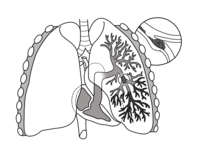
Photo from wikipedia
Coronavirus disease 2019 (COVID-19) has been associated with an increased risk of thromboembolic complications due to systemic coagulation activation. Little is known about the role of direct anticoagulants (DOACs) in… Click to show full abstract
Coronavirus disease 2019 (COVID-19) has been associated with an increased risk of thromboembolic complications due to systemic coagulation activation. Little is known about the role of direct anticoagulants (DOACs) in COVID-19 related thrombosis. In this audit we sought to distinguish COVID-19 hospitalised patients with a diagnosis of venous thromboembolism (VTE) and record their outcomes over a period of 3 months (01/02/2020–30/04/2020). A total of 1583 patients were diagnosed with laboratory proven COVID-19 disease. Amongst them, 38 patients (0.82%) suffered VTE (median age 68 years, male/female: 20/18). VTE was the presenting symptom on admission in 71%. Pulmonary embolism was diagnosed in 92% of patients; 5 patients required intensive care and 3 underwent thrombolysis. 27 patients received initial treatment with unfractionated heparin/low molecular weight heparin (LMWH) while 10 were treated with direct anticoagulants (DOACs). After a median follow up of 25 days, 29 (76%) patients were alive while 5 were still hospitalised. Most patients (83%) were discharged on DOACs, no VTE recurrence or bleeding was recorded post-discharge. Our results suggest that direct anticoagulants could be a safe and effective treatment option in selected COVID-19 positive patients who have suffered venous thromboembolism.
Journal Title: Journal of Thrombosis and Thrombolysis
Year Published: 2020
Link to full text (if available)
Share on Social Media: Sign Up to like & get
recommendations!